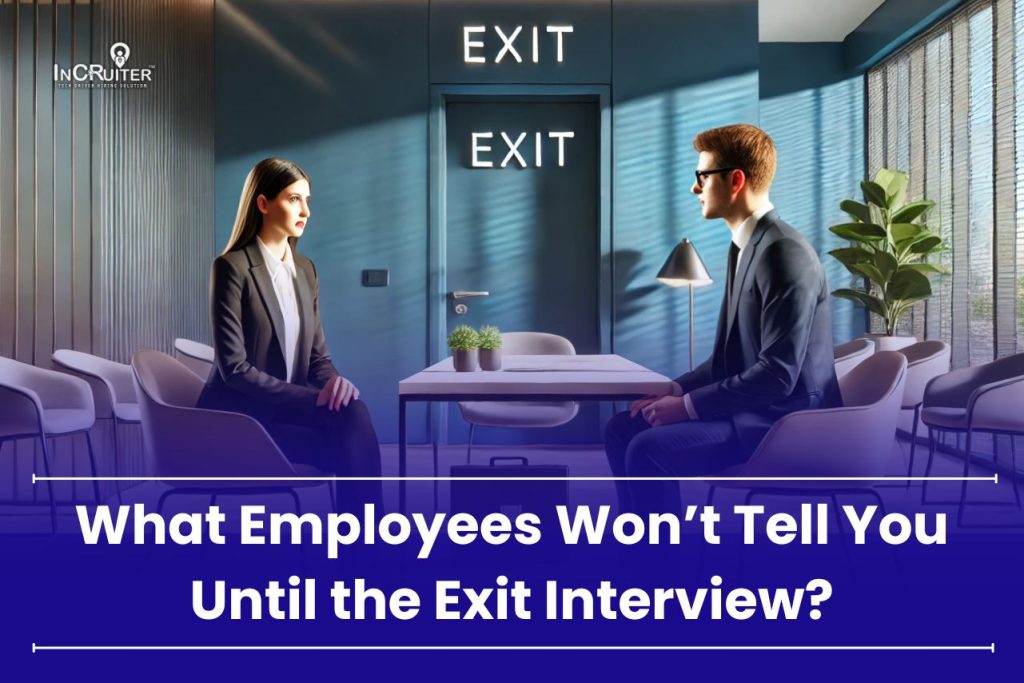
“I’ve actually been unhappy here for over a year.” These nine words, often uttered in exit interviews, represent thousands of dollars in recruitment costs and countless hours of lost productivity that could have been avoided. Exit interviews, those seemingly routine conversations at the end of employment, often reveal shocking truths that have been hidden in plain sight. They’re not just formalities but treasure troves of brutal honesty that, if uncovered sooner, could have saved valuable talent.
Let’s explore what employees keep to themselves until they have nothing to lose.
Honest Truth Employees Hold Back Until They Quit
“I Was Looking for a New Job for Months – You Just Didn’t Notice”
Most employees spend 3-5 months job hunting before they quit. During this time, they’re taking “dentist appointments” that are interviews, while their LinkedIn privacy settings silently switch to “open to work.” The red flags were decreased meeting participation, minimum effort, and vacant stares during team events. When HR schedules that exit interview, they simply document a failure that observant leadership could have prevented months ago. The classic “this came as a surprise” reaction from management? It’s rarely a surprise to anyone but them.
“Your ‘Open-Door Policy’ is a Joke”
Saying “My door is always open” means nothing when employees get subtle eye-rolls when they walk through it. Companies love to brag about transparency while simultaneously creating environments where speaking up is career suicide. “I tried bringing this up last year, but nothing changed” is the exit interview code for “I gave you a chance to fix this.” The disconnect between what leadership thinks their culture is versus what employees experience creates a silence that festers until resignation day. The brutal irony? Many bosses genuinely believe employees would tell them if something was wrong.
“Management is the Problem, But No One Will Admit It”
The unvarnished truth is that people rarely quit companies; they quit toxic bosses. Exit interviews frequently reveal the manager who plays favorites, takes credit for others’ work, or lacks basic emotional intelligence. “The company culture is great, but working under Sarah was unbearable,” they’ll finally admit. The actual retention killers are the micromanager who required three approvals for a simple email, the executive who publicly humiliated team members, and the supervisor who blocked promotions to keep their stars. Employees stay silent because filing complaints against someone who controls your career advancement feels like professional Russian roulette.
Also Read: Exit Interview
“You Only Care About Clients, Not Your Employees”
“The customer is always right” has a dark underbelly that exit interviews expose: “…and employees always come last.” Workers notice when they’re expected to sacrifice weekends for client emergencies while leadership preaches work-life balance from their vacation homes. They see the stark contrast between lavish client entertainment budgets and the elimination of the holiday party “due to cost-cutting measures.” The exit interview often reveals months or years of building resentment: “I watched you bend over backward for clients who treated us terribly, but you couldn’t approve my request for updated equipment I needed to do my job effectively.”
“Your Pay Isn’t Competitive, But We’re Too Afraid to Say It”
“I’m leaving for better opportunities” usually translates to “I’m getting paid 30% more to do the same job elsewhere.” Employees silently research market rates on Glassdoor and LinkedIn while smiling through annual reviews offering 15-30% raises. They don’t mention their financial struggles because they’ve seen how the company treats “money-motivated” team members. The fear is actual employees worry that salary discussions will brand them as disloyal or greedy. The painful revelation in exit interviews? Many companies would have willingly matched competitive offers if they’d known, but the employee had already mentally checked out by then.
“We’re Drowning in Work, But No One Listens”
“I’m handling three people’s jobs” is the confession that finally emerges when there’s nothing left to lose. Employees don’t admit they’re overwhelmed because they’ve been conditioned to see burnout as a personal failure. They notice when their “I’m struggling with workload” concerns are dismissed with toxic positivity: “We’re all busy!” or “This is just a busy season!” (that somehow lasts all year). Leadership often mistakes silence for contentment, only to be blindsided when a star performer reaches their breaking point. By the exit interview, the employee is too exhausted to sugarcoat it anymore: “I’m leaving because I haven’t had a full weekend off in eight months.”
Also read: Exit Interview: Top 5 Questions You Must Ask
Why Employees Stay Silent Until Exit Interviews?
Fear of Retaliation
The calculus is simple but sobering – “Is this issue worth potentially tanking my career?” Employees have witnessed the subtle punishment of those who speak up, the colleague who raised concerns and suddenly received critical performance reviews, or the team member whose promotion mysteriously stalled after questioning a policy. With references and professional reputations on the line, many conclude that silence is the safer option. Even in companies that prohibit retaliation on paper, employees have seen the unwritten rules in action and choose self-preservation until they have another job locked down.
Feeling Unheard
“What’s the point? Nothing will change anyway.” This defeated sentiment comes from employees who tried giving feedback through proper channels only to watch it disappear into the corporate void. They filled out engagement surveys honestly, participated in focus groups, and raised concerns in one-on-ones, all to no avail. Each ignored suggestion or dismissed complaint taught them that the company doesn’t want honesty; it wants compliance. By the exit interview service provider, they’ve accumulated enough evidence of institutional deafness that speaking freely finally feels cathartic rather than futile.
Also Read: Blogs of Exit Interviews
Avoiding Workplace Tension
Nobody wants to be labeled the “difficult employee” or “not a team player.” Many workers stay silent to maintain workplace harmony, especially in cultures that prize agreeableness above authenticity. They’ve calculated that enduring daily frustrations is preferable to becoming the office pariah who dared challenge the status quo. The exit interview offers a sweet release; they can finally name the elephant in the room without worrying about awkward elevator rides or strained team meetings afterward. “I hated our pointless daily stand-ups” feels liberating when you’ll never have to attend another one.
Lack of Trust in HR
Many employees view HR as management’s enforcement arm, not their advocate. They’ve watched HR prioritize company liability over employee wellbeing or seen confidential complaints mysteriously reach the implicated managers. “HR works for the company, not for me” is the cynical but common perspective that keeps employees from sharing concerns until they’re halfway out the door. The exit interview paradoxically feels safer precisely because HR suddenly seems interested in their honest opinion when it can no longer threaten their position.
Wanting to Leave on Good Terms
“I need to preserve these relationships for future networking.” Career-savvy employees understand that burning bridges limits future opportunities, especially in tight-knit industries. They strategically choose to suffer in silence rather than risk being blacklisted or developing a reputation as difficult. This calculation often includes financial considerations, severance packages, unused PTO payouts, and future references that can depend on departing amicably. The exit interview becomes a careful balancing act: honest enough to feel authentic but diplomatic enough to maintain professional goodwill.
Also read: Top 10 Interview as a Service Platforms in India
How Companies Can Use Exit Interviews for Real Change?
Stop Treating Exit Interviews as a Check-the-Box Exercise
Most third party exit interview companies are performative theater. The forms are filed, the boxes are checked, and the insights gather digital dust in an HR database that nobody reviews. Companies serious about improvement treat exit data like gold, not garbage. Take Hubspot, which transformed its notorious burnout culture after exit interviews revealed unsustainable expectations. Or Patagonia, which revamped its parental leave policies after losing key female talent. The difference? These companies didn’t just listen; they acted on an exit interview feedback report. If you’re collecting exit feedback without a third-party Exit Interview Service to analyze trends and implement changes, you’re not conducting exit interviews; you’re just saying goodbye with extra paperwork.
Identify Patterns Instead of Dismissing ‘One-Off’ Complaints
“That’s just Sarah being dramatic” is the corporate equivalent of putting your fingers in your ears. Innovative companies know three employees citing the same issue in exit interviews even months apart isn’t a coincidence; it’s a pattern. When Airbnb noticed multiple departing employees mentioning communication breakdowns between product and engineering teams, they didn’t dismiss it as personality conflicts. They restructured their workflows and saved countless future resignations. The danger lies in the tendency to discount individual experiences that contradict our preferred narrative. Companies that rely on structured, third-party exit interview services avoid this blind spot by identifying hidden patterns objectively, ensuring no critical insight is overlooked, and taking proactive steps before turnover spirals out of control.
Also read: Exit Interview
Implement Stay Interviews Before It’s Too Late
Imagine a company waiting until its best employees walk out the door before realizing something is wrong. The most competent organizations don’t take that risk. They actively seek insights when employees leave and as part of a continuous strategy to strengthen their workforce. Companies like Adobe and Deloitte don’t wait for exit interviews to uncover dissatisfaction; they engage employees through meaningful conversations that identify minor frustrations before they become major retention problems. However, even when employees do leave, the opportunity isn’t lost. A well-structured exit interview process provides a wealth of insights, pinpointing patterns, refining leadership approaches, and shaping a workplace where people want to stay. Companies that leverage this data don’t just react to turnover; they use it as a blueprint for long-term success.
Also read: Exit Interview Services: A Key to Reducing Employee Turnover.
Conclusion
Employee turnover isn’t just a cost; it’s a signal. Every resignation holds valuable insights that can transform how companies attract, retain, and engage top talent if captured and analyzed correctly. The difference between organizations that continuously improve and those that struggle with retention isn’t luck; it’s the ability to act on honest, unfiltered feedback before it’s too late. Exit interviews aren’t just a farewell formality; they’re strategic assets that reveal the truth about leadership effectiveness, workplace culture, and growth opportunities. The most competent companies don’t wait for another key employee to walk out before taking action; they make informed decisions today to build a better workforce for tomorrow.
Book a demo with InCruiter now and turn exit insights into retention strategies before another great employee leaves.
Ready to Transform Your Hiring Process?
Discover how our AI-powered interview platform can streamline your recruitment and find the best candidates faster.






